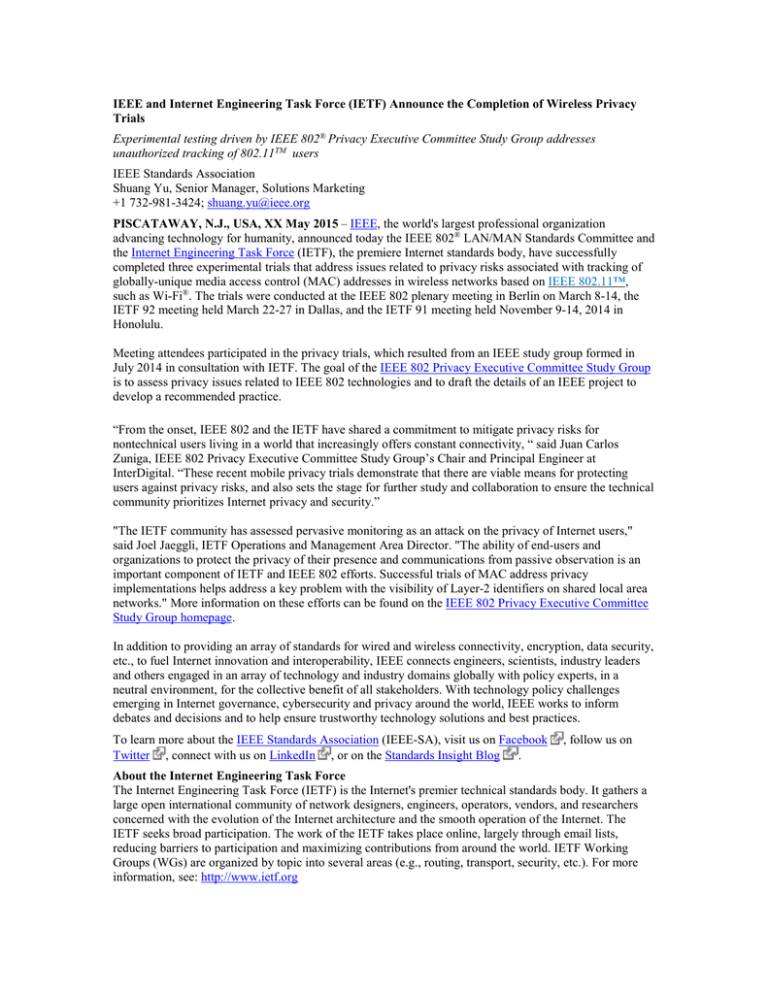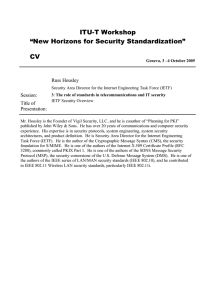IEEE and Internet Engineering Task Force (IETF) Announce the Completion... Trials Experimental testing driven by IEEE 802
advertisement

IEEE and Internet Engineering Task Force (IETF) Announce the Completion of Wireless Privacy Trials Experimental testing driven by IEEE 802® Privacy Executive Committee Study Group addresses unauthorized tracking of 802.11TM users IEEE Standards Association Shuang Yu, Senior Manager, Solutions Marketing +1 732-981-3424; shuang.yu@ieee.org PISCATAWAY, N.J., USA, XX May 2015 – IEEE, the world's largest professional organization advancing technology for humanity, announced today the IEEE 802® LAN/MAN Standards Committee and the Internet Engineering Task Force (IETF), the premiere Internet standards body, have successfully completed three experimental trials that address issues related to privacy risks associated with tracking of globally-unique media access control (MAC) addresses in wireless networks based on IEEE 802.11™, such as Wi-Fi®. The trials were conducted at the IEEE 802 plenary meeting in Berlin on March 8-14, the IETF 92 meeting held March 22-27 in Dallas, and the IETF 91 meeting held November 9-14, 2014 in Honolulu. Meeting attendees participated in the privacy trials, which resulted from an IEEE study group formed in July 2014 in consultation with IETF. The goal of the IEEE 802 Privacy Executive Committee Study Group is to assess privacy issues related to IEEE 802 technologies and to draft the details of an IEEE project to develop a recommended practice. “From the onset, IEEE 802 and the IETF have shared a commitment to mitigate privacy risks for nontechnical users living in a world that increasingly offers constant connectivity, “ said Juan Carlos Zuniga, IEEE 802 Privacy Executive Committee Study Group’s Chair and Principal Engineer at InterDigital. “These recent mobile privacy trials demonstrate that there are viable means for protecting users against privacy risks, and also sets the stage for further study and collaboration to ensure the technical community prioritizes Internet privacy and security.” "The IETF community has assessed pervasive monitoring as an attack on the privacy of Internet users," said Joel Jaeggli, IETF Operations and Management Area Director. "The ability of end-users and organizations to protect the privacy of their presence and communications from passive observation is an important component of IETF and IEEE 802 efforts. Successful trials of MAC address privacy implementations helps address a key problem with the visibility of Layer-2 identifiers on shared local area networks." More information on these efforts can be found on the IEEE 802 Privacy Executive Committee Study Group homepage. In addition to providing an array of standards for wired and wireless connectivity, encryption, data security, etc., to fuel Internet innovation and interoperability, IEEE connects engineers, scientists, industry leaders and others engaged in an array of technology and industry domains globally with policy experts, in a neutral environment, for the collective benefit of all stakeholders. With technology policy challenges emerging in Internet governance, cybersecurity and privacy around the world, IEEE works to inform debates and decisions and to help ensure trustworthy technology solutions and best practices. To learn more about the IEEE Standards Association (IEEE-SA), visit us on Facebook Twitter , connect with us on LinkedIn , or on the Standards Insight Blog . , follow us on About the Internet Engineering Task Force The Internet Engineering Task Force (IETF) is the Internet's premier technical standards body. It gathers a large open international community of network designers, engineers, operators, vendors, and researchers concerned with the evolution of the Internet architecture and the smooth operation of the Internet. The IETF seeks broad participation. The work of the IETF takes place online, largely through email lists, reducing barriers to participation and maximizing contributions from around the world. IETF Working Groups (WGs) are organized by topic into several areas (e.g., routing, transport, security, etc.). For more information, see: http://www.ietf.org About the IEEE Standards Association The IEEE Standards Association, a globally recognized standards-setting body within IEEE, develops consensus standards through an open process that engages industry and brings together a broad stakeholder community. IEEE standards set specifications and best practices based on current scientific and technological knowledge. The IEEE-SA has a portfolio of over 1,100 active standards and more than 500 standards under development. For more information visit the IEEE-SA Web site. About IEEE IEEE, a large, global technical professional organization, is dedicated to advancing technology for the benefit of humanity. Through its highly cited publications, conferences, technology standards, and professional and educational activities, IEEE is the trusted voice on a wide variety of areas ranging from aerospace systems, computers and telecommunications to biomedical engineering, electric power and consumer electronics. Learn more at the IEEE Web site .

